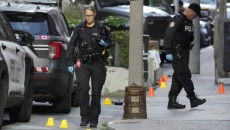Business groups continued to call on the federal government to take action in the wake of the recently resolved British Columbia port workers dispute on Saturday, arguing Ottawa must ensure such a disruption never happens again.
But the federal government is walking a difficult tightrope between the demands of the business community and protecting workers' constitutional rights, labour experts said.
"On one hand, they obviously don't want to offend the very powerful business community. On the other hand, they don't want to alienate the labour groups they've been courting for years," said Larry Savage, a professor in the labour studies department at Brock University.
The union representing about 7,400 B.C. port workers announced Friday that members had voted almost 75 per cent in favour of their latest contract offer, ending five weeks of turbulence that stopped the shipping of billions of dollars’ worth of goods. This included a 13-day strike that began on Canada Day, affecting more than 30 B.C. port terminals and other related sites.
"Thank you to all of my sisters and brothers of ILWU international, port workers from around the world and numerous non-port workers unions who came in solidarity to support us in our fight," Rickey Baryer, vice-president of the port workers union's Local 500, said in a social media post Saturday.
After the results of the ratification vote were announced, federal Labour Minister Seamus O’Regan issued a statement saying he was directing federal officials to review the entire case to avoid a port disruption of this magnitude from happening in the future.
"This dispute caused serious disruption to our supply chains, risking our strong international reputation as a reliable trading partner. We do not want to be back here again," said O'Regan, adding, "We will have more to say on this soon."
The ILWU Canada membership has voted in favour of the deal.
— Seamus O'Regan Jr (@SeamusORegan) August 5, 2023
Both parties have now ratified the agreement.
Statement from Minister Rodriguez and me: pic.twitter.com/xpyTFgxtAo
Representatives from O'Regan's office offered no further comment on Saturday.
The Liberal government has been under intense pressure to settle the port dispute for weeks, said Savage.
Business groups and some political leaders called for back-to-work legislation amid the dispute and say concrete action is still needed now that it has come to an end, with the Canadian Federation of Independent Business asking the feds to designate ports as an essential service and scrap its promise to ban replacement workers.
The strike and the uncertainty it caused has been costly for small businesses, federation President Dan Kelly said in a statement Saturday.
"Although the work stoppage is over, it will take weeks for the backlog to be addressed and, as a result, the financial consequences for small businesses across Canada will be challenging for months to come."
Kelly said the situation shows an urgent need to rethink Canadian labour laws so that the broader economy and Canada’s international reputation are considered in the cases of strikes and lockouts in critical areas.
The Canadian Chamber of Commerce also chimed in, with Vice-President Robin Guy issuing a statement saying Ottawa needs to "consider providing new tools that can be used in the face of labour disputes in sectors that are critical to Canada’s supply chain."
The changes being called for by business groups, if enacted, would weaken workers' rights and powers in negotiations and sweep key issues under the rug, said Barry Eidlin, an associate professor of sociology at McGill University specializing in labour movements and labour policy.
But some would also be difficult to enact, he said. Workers have constitutional rights when it comes to labour action, including striking.
Eidlin said throughout the B.C. ports dispute, he was struck by what he described as an an ongoing pattern in Canadian labour relations that sees calls for back-to-work legislation floated as a default response in some quarters.
"That is just a very destructive dynamic for having healthy industrial relations," he said. "It basically short-circuits the collective bargaining process and puts the thumb on the scales for the employer side, and then reduces their incentive to actually bargain."
This issue is a "minefield" for the Liberal government, Savage added.
"If they do what the business community wants, they will not only alienate organized labour but they will also potentially find themselves violating the Charter of Rights," he said.
Baryer, in his social media post, claimed the B.C. Maritime Employers Association wanted the government to step in and impose a settlement from the start of the dispute.
"It was made quite apparent by the BCMEA that they had no intention of showing its workers any respect by coming to the table to make a deal," Baryer wrote.
The Liberals and the NDP have promised anti-scab legislation through their supply-and-confidence agreement, noted Savage, something the labour movement has sought for more than two decades.
While no details have emerged about the four-year deal covering the B.C. port workers, the employers association said in a statement that it "includes increases in wages, benefits and training that recognizes the skills and efforts of B.C.’s waterfront workforce."
Union membership voted over a two-day period after the union and the employers jointly announced a tentative agreement last Sunday night.
The ratification comes after the union rejected a mediated settlement twice in July, once through the group's leadership caucus and another after a vote by the full membership.
The new deal was reached with the help of a mediator from the Canada Industrial Relations board, which reminded union local presidents that if they changed their position and didn't support the deal after originally agreeing, it could be considered unfair labour practice.
The employers had said the previous, rejected four-year deal included a pay increase that would have taken the median wage for a union longshore worker from $136,000 to $162,000 annually. It also included a signing bonus amounting to about $3,000 per full-time worker. It's unclear whether those changes remained in the latest contract.
The two sides had been negotiating since February, with the last agreement expiring at the end of March. The main points of contention had been protecting jobs against automation and the contracting out of maintenance work to third parties.






